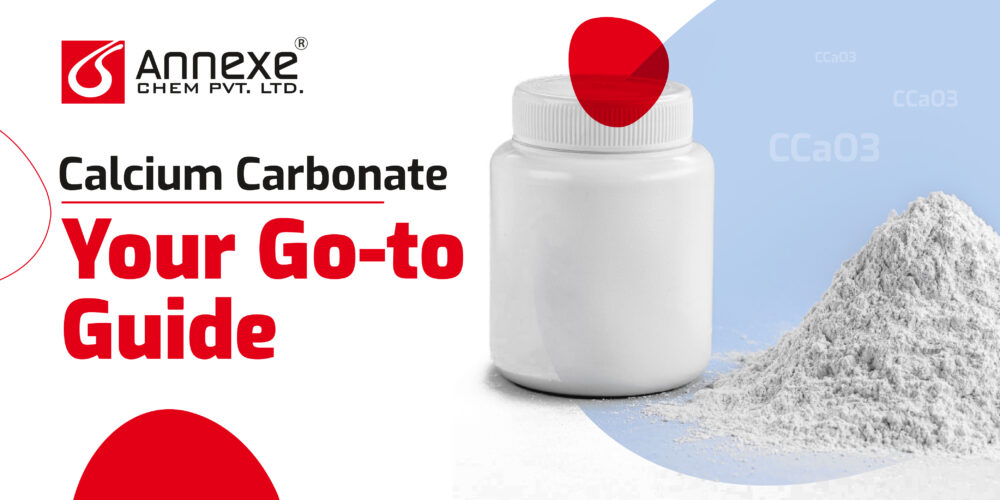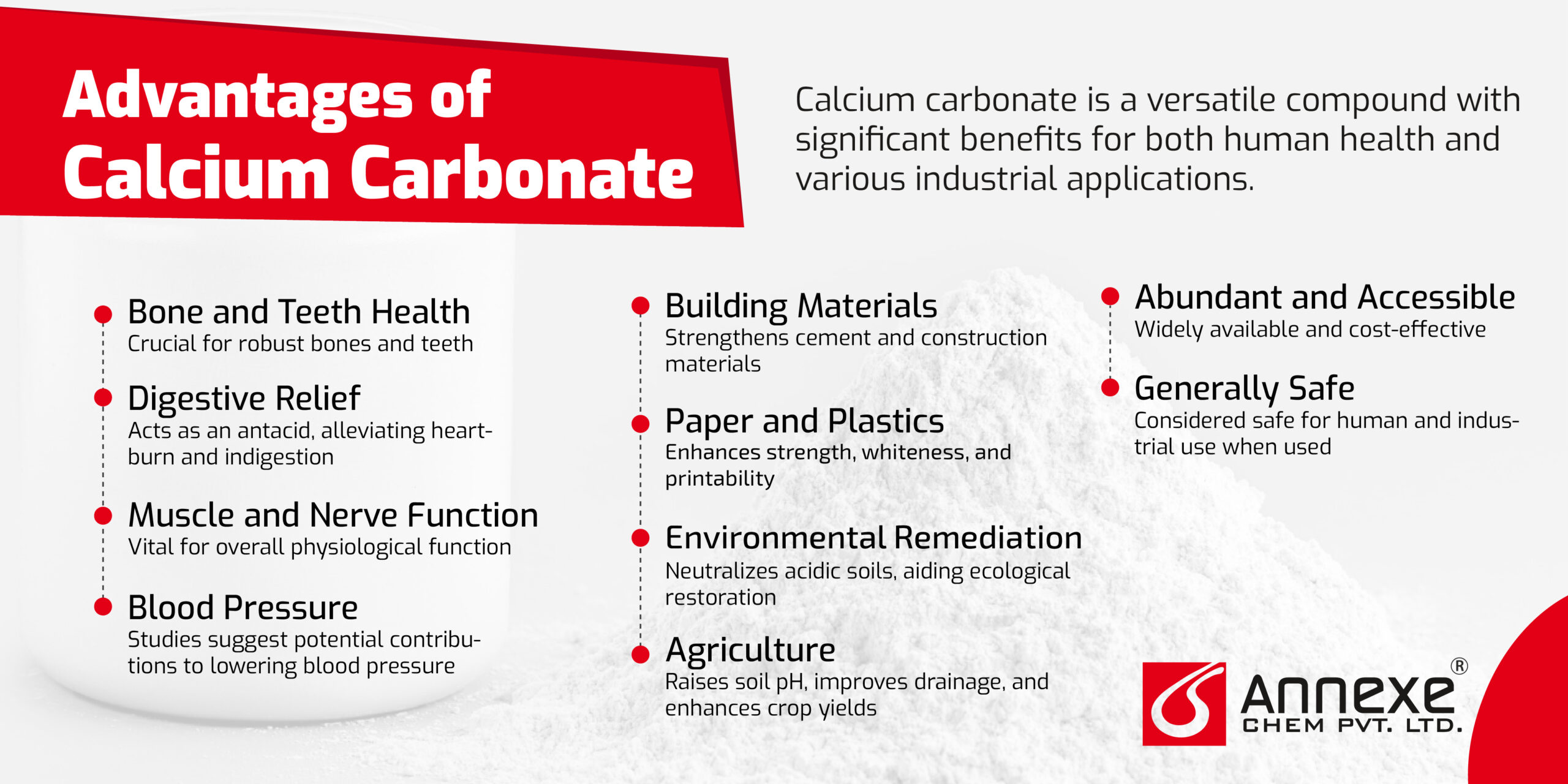Calcium Carbonate: Your Go-to Guide - Annexe Chem Pvt Ltd
Calcium Carbonate: Your Go-to Guide

- January 8, 2024
- By Akshita Patel
Calcium carbonate is a chemical composite with the formula CaCO3. It’s a white powder or colorless crystal composed of one atom of calcium, one of carbon, and three of oxygen. Calcium carbonate is found in rocks all over the world, mainly limestone. Furthermore, it is a significant component of eggshells, corals, chalk, marble, and shells of bivalve animals. It is just a little to know about Calcium Carbonate. Let’s understand more about the classic compound with numerous advantages and uses.
Chemical Composition of Calcium Carbonate
Calcium carbonate (CaCO3) is a chemical compound composed of calcium, carbon, and oxygen. It is a standard substance found in rocks as the minerals calcite and aragonite, and it is the main component of shells of marine organisms, snails, and pearls. The chemical formula for calcium carbonate shows the presence of one calcium (Ca) atom, one carbon (C) atom, and three oxygen (O) atoms in every molecule. The molar mass of calcium carbonate is nearly 100.09 grams per mole.
The chemical equation describing the formation of calcium carbonate is:
Ca 2 + ( aq ) Calcium ion + CO 3 2 – ( aq ) Carbonate ion → CaCO3 ( s ) Calcium carbonate.
Physical Properties of Calcium Carbonate
Calcium carbonate (CaCO3) has diverse physical properties, and these characteristics can vary depending on the specific crystal form or the way it is prepared. Here are some general physical properties of calcium carbonate:
- State: Calcium carbonate occurs naturally in various forms, such as chalk, limestone, marble, and aragonite. It can be found in solid, crystalline, or amorphous powder forms.
- Color: It can range from white to colorless when pure. However, impurities can give it different colors, such as shades of pink, brown, or yellow.
- Odor: Calcium carbonate is generally odorless.
- Taste: It is virtually tasteless.
- Solubility: Calcium carbonate is sparingly soluble in water. It dissolves more readily in acidic solutions due to the formation of soluble calcium salts.
- Density: The density of calcium carbonate depends on its form. For example, the density of chalk is lower than that of marble.
- Melting Point: Calcium carbonate has no specific melting point since it decomposes before reaching a liquid state. It undergoes thermal decomposition to produce calcium oxide.
- Hardness: Calcium carbonate is relatively soft compared to some other minerals. On the Mohs scale of mineral hardness, calcite, a form of calcium carbonate, has a hardness of 3.
- Crystal Structure: Calcium carbonate crystallizes in different crystal systems, depending on the form. For example, calcite has a trigonal crystal structure, while aragonite has an orthorhombic crystal structure.
- Transparency: Calcium carbonate can be transparent to translucent.
These properties impart to the various uses of calcium carbonate in different industries like cement, as a dietary supplement, in the paper and paint industries, and as a building material.

Uses of Calcium Carbonate
Calcium carbonate, a versatile and ubiquitous compound, plays a pivotal role in various industries and applications, serving as an essential component with many uses. This inorganic compound, with the chemical formula CaCO3, is abundantly found in nature in various forms, such as limestone, marble, and chalk. Its widespread availability and unique properties make it a fundamental substance in fields ranging from construction and agriculture to healthcare, and others. Here’s a peek into its diverse uses:
In Healthcare:
- Calcium Supplement: Recognized as the most easily absorbed calcium form, calcium carbonate is a cornerstone in dietary supplements, effectively addressing deficiencies, strengthening bones, and preventing osteoporosis.
- Antacid: Renowned for its prowess in neutralizing stomach acid, calcium carbonate serves as an effective antacid, providing relief from common issues like heartburn, indigestion, and acid reflux.
- Phosphate Binder: In kidney disease management, calcium carbonate plays a crucial role as a phosphate binder. By binding excess phosphate in the digestive tract, it aids in preventing its absorption, thereby maintaining a delicate mineral balance.
- Other Medical Uses: Beyond these applications, calcium carbonate finds its way into diverse medical treatments. It is implicated in reducing high blood pressure, managing specific types of poisoning, and addressing certain skin conditions, showcasing its versatility in healthcare.
In Construction and Infrastructure:
- Cement Production: Limestone, a highly abundant form of calcium carbonate, assumes a critical role in cement production, the foundational binding agent in buildings, roads, bridges, and various infrastructure projects.
- Building Materials: Marble, another distinct form of calcium carbonate, renowned for its aesthetic appeal and durability, has become a sought-after material for the crafting of countertops, flooring, sculptures, and decorative elements.
- Road Base Material: Crushed limestone is a stable and reliable base material for roads and highways. Beyond enhancing stability, it contributes to improved drainage and erosion prevention.
Manufacturing Industry:
- Paper and Plastics Filler: Calcium carbonate is a versatile filler in the manufacturing sector. In the paper industry, it enhances brightness, opacity, and printing quality. Simultaneously, it imparts strength and whiteness to plastics, contributing to resource conservation.
- Paint and Rubber Additive: Employed as an additive in both paints and rubber, calcium carbonate serves as a cost-effective filler and extender. It reduces production costs and enhances the physical properties of the final products.
- Soil Amendment: In the agricultural domain, calcium carbonate behaves as a crucial soil amendment. Its capacity to neutralize acidic soils, improve drainage, and supply essential calcium promotes optimal conditions for plant growth, ultimately leading to improved crop yields.
- Environmental Remediation: The acidity-neutralizing capabilities of calcium carbonate find practical application in environmental remediation. From addressing acid mine drainage to treating contaminated water bodies, it contributes significantly to ecological restoration efforts.
Other Uses:
- Food Additive: Widely accepted as a safe food additive, calcium carbonate is a firming and anticaking agent in various food products, including baked goods and processed items.
- Sugar Refining: In sugar refining, calcium carbonate plays a pivotal role. Its inclusion aids in the removal of impurities and contributes to the clarification of the final sugar product.
- Aquarium Substrate: Recognized for its role beyond industrial and medical applications, crushed coral and limestone derived from calcium carbonate are utilized as substrates in aquariums. It provides a stable base for beneficial bacteria and helps maintain the desired water chemistry for aquatic life.
Precautions using Calcium Carbonate
While calcium carbonate is generally considered safe for many applications, caution is needed to ensure safe handling and use. Here are some essential precautions when using calcium carbonate:
- Inhalation Precautions: Avoid inhaling calcium carbonate dust to avoid exposure that may lead to respiratory irritation. Use appropriate respiratory protection (e.g., dust masks) if dust is there.
- Skin and Eye Contact: Avoid direct skin contact with calcium carbonate, especially if you have sensitive skin. In case of contact, wash the affected area with plenty of water. Wear protective gloves and safety goggles or face shields when handling.
- Ingestion: Calcium carbonate is generally safe when ingested enough, such as when used as a dietary supplement. However, excessive ingestion can lead to health issues. Follow recommended guidelines for consumption, especially in food and pharmaceutical applications.
- Storage Conditions: Store it in a cool, dry place away from incompatible materials. Keep containers tightly closed to prevent moisture absorption and contamination.
- Read and Follow Safety Data Sheets (SDS): Familiarize yourself with the SDS for the specific form of calcium carbonate you are working with. Follow recommended safety guidelines and emergency procedures.
- Consultation with Professionals: If you have specific concerns or questions regarding the safety of calcium carbonate in your particular application, consult with safety professionals or relevant experts.
Conclusion
Calcium carbonate is a versatile compound with considerable applications, from healthcare to construction, agriculture, and various industries. Its chemical composition, physical properties, and numerous advantages make it a valuable and widely used substance. However, take precautions when handling calcium carbonate to ensure safety in various settings.
For reliable and high-quality calcium carbonate products, consider association with Annexe Chem Pvt. Ltd., a leading pharmaceuticals and chemical company in Vadodara. Established in 2001, the company evolved from Sigma Chemicals to Annexe Chem Private Limited in 2008, specializing in fine chemicals. The company prioritizes quality, advanced packaging, and competitive pricing through a robust distribution network, contributing to its sustained success since its inception. With our expertise and commitment to safety, we are well-equipped to provide top-notch products for diverse applications.
Contact us today for your calcium carbonate needs and experience excellence in quality and assistance.

Akshita Patel
As an advocate for sustainability, Akshita is committed to driving positive change within the chemical industry. She actively seeks out environmentally friendly solutions and promotes the adoption of sustainable practices. Akshita believes that a balance between economic growth and ecological responsibility is crucial for the industry's long-term success. She is dedicated to finding innovative ways to minimize environmental impact while maximizing efficiency and profitability.
Related Blogs

- January 24, 2024
- By Akshita Patel
Thiourea: Unraveling Its Diverse Applications
Thiourea is an organosulfur compound with the formula SC(NH₂)₂ and the structure H₂N−C−NH₂. The sulfur atom.

- December 18, 2023
- By Akshita Patel
Zinc Gluconate: A Comprehensive Guide
Zinc Gluconate is a chemical compound formed by combining zinc, an essential mineral, with gluconic acid,.



